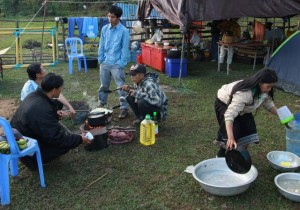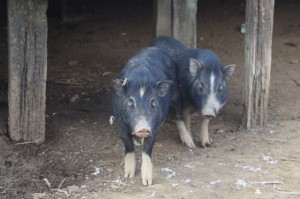Project Sekong 2012: We have five different ethnic groups in camp and no agreement on favorite foods or how to coexist with pigs.
Report 13
Update on the Pig War:
Round One went to the pigs. They ate our sugar, our beans and our cabbage. All stuff intended for breakfast. But…let’s call a spade a spade: they ate our lunch.
Round Two: We come out fighting. Armed with slingshots, we get in more than a few good licks.
Round Three: Feeling cocky, we start boasting of not just a win, but of applying punishment and exacting revenge.
Rounds Four, Five and Six: They just keep coming, no matter how many times we run them off. It dawns on us that the pigs have been doing the rope-a-dope, letting us fail at them, wearing down our strength, our resources and our resolve.
Round Seven: Nearly exhausted, we give up hope of a decisive victory and start telling one another that a split decision is still a win.
Round Eight: We start hoping for a draw. The pigs come and go as they please, sometimes annoyingly underfoot. It’s easier to kick at them than to throw rocks. There’s talk among the team that a fair compromise would be for the pigs to eat in camp but crap somewhere else.
Round Nine: We abandon hope. We just pray that villagers don’t notice of our humiliation. Which is going to be difficult to conceal: this morning a farmer walked into camp carrying the pair of shoes that I left outside my tent last night. He wondered if they might belong to someone in our camp. He found his pigs chewing on them, outside his house. What I’m wondering is how did a pair of shoes leave camp? (A pair. That’s like two shoes.) Did two pigs carry one each, or did one pig make two trips?
Round Ten: Yet to come, but I’m an advocate for unconditional negotiations, with no pre-conditions. Hey! Technically, the Korean War has never ended but sixty years of “armistice” has let both sides save face and claim victory.

We've somehow fallen into the habit of washing dishes before we need them rather than after we use them. Probably poor hygiene but good conflict resolution.
Cooking in Camp:
The team eats breakfast together. What’s left from breakfast we pack up and carry into the field to eat for lunch. In the morning everyone wakes up hungry and since we’re in a rush, no one quibbles over the menu.
Dinner, however, has become problematic. After work, after a bath, there’s only dinner to look forward to and strong preferences are beginning to emerge.
Our team is ethnically diverse. I’m American but everyone on the team simply lumps me into the larger cohort, “falang,” which includes any western foreigner. Chomrong, our Team Leader, is ethnically Khmer and a proud Cambodian nationalist. Yai is lowland Lao, as is Dao Vieng our driver. Both Kik and Pang See, our two female deminers, are Laven, an ethnic group that populates the Bolaven Plateau. Our two male deminers, Yua Xiong Vue and Chan Mai Vue, are both Hmong.
After the first week, the team has mostly given up on communal cooking. Chomrong and the Hmong guys clearly prefer steam rice. The rest of us, sticky rice. I prefer mostly vegetarian meals; all the rest of the team likes their meat.
Some of us like fish but only if its boneless. Others are indifferent to even the needle-like bones of the bait-sized fish raised here in village ponds. And, opinions vary greatly on how the various meats and vegetables should be prepared, depending upon regional, cultural, familial and individual preferences for certain sauces, spices, condiments and cooking techniques.
In any case, what’s evolved is that, in the evening, everyone has started cooking for himself or, at most, a couple of compatriots.
The first couple of nights we followed the common sense rule: “If you cook, you clean up after yourself and wash whatever pans and utensils you use”. That might have been sensible but actual compliance, if it ever began, ended almost immediately.
The current practice is that the pigs clean up all our garbage and nobody washes anything until they need it. If you need it and you mind it being dirty, you wash it and then cook with it or eat from it. Then, you leave it for the next fellow to decide whether he wants it washed before he uses it. In a sense it’s the original rule, just turned on its head. We’re all washing what we use, but just minutes before we use it.
It’s a typically Lao solution that achieves the same end as the original plan and avoids the conflict that would result from scolding people who didn’t wash the  dishes that they  dirtied.

